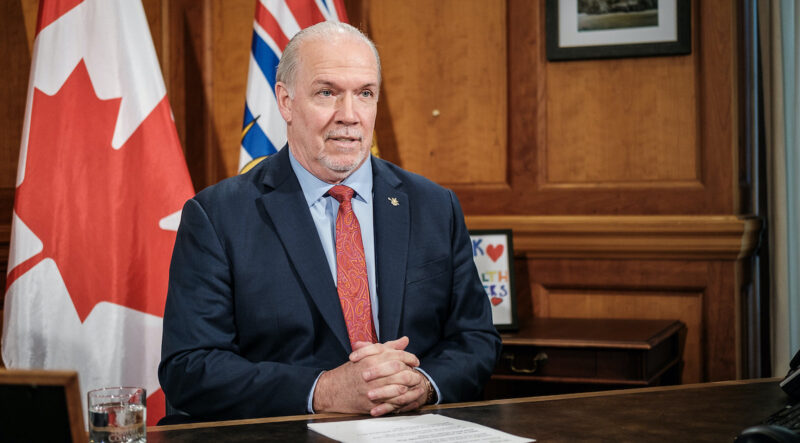‘Dead Loss’ report on aquaculture is dead wrong
BC Premier John Horgan takes aim at federal aquaculture decision, as calls mount for anti-salmon farm activist groups to be held accountable for spreading false information
By Fabian Dawson
SeaWestNews
Using guesstimates and fact-deficit analyses, a UK-based activist group named “Changing Markets” has released an economic paper that purports to measure the impacts of global salmon farming.
The findings in the report – Dead Loss – which makes unproven headline-grabbing claims, alleges salmon farmers have cost Canada over US$2.3 billion since 2013 in so-called hidden costs like unnecessary salmon mortalities, destruction to local ecosystems and pressure on wild fish stocks.
The report does, however, acknowledge that salmon farming is in fact more sustainable than other food production sectors, but fails to include any comparison data or context about how much food the sector produces to help feed the world.
“Unfortunately, a review of the paper makes it clear that this is simply activism masquerading as academic analysis. The paper is not supported by facts, includes no discussions with independent experts, and lacks the critical context required to offer useful insights,” said Trond Davidson, president of the International Salmon Farmers Association (ISFA).
“Beyond the big numbers in the headlines, the report relies on several data points that are carefully cherry picked, and in some cases are no more than guesses,” he said.
“Now more than ever, activist groups must be held accountable for spreading false and misleading information.”
The BC Salmon Farmers Association (BCSFA) said the report is blatantly misleading, and is wholly dependent on using selected data without context, assumptions, and generalizations without any research, data or science to back up the majority of its claims.
“It is unfortunate that critics of this industry opted to release yet another ill-informed report which does not look to provide solutions or create a shared path forward, but instead relies on and perpetuates outdated science and misinformation,” said an association spokesperson.
“In truth, BC’s salmon farmers sustainably supply more than 6.5 million meals every week. Globally, salmon farming produces 17.5 billion meals on an annual basis. By any measure, we are one of the most sustainable farmed protein sectors in the world – carbon footprint, water use, and feed conversion included,” he said.
Four of the top 10 publicly traded animal protein companies rated for sustainable production by the prestigious Coller FAIRR Protein Producer Index , including the top spot, are held by salmon farming companies.
“As with any farming practice there is always room for improvement, and that is a driving passion for salmon farmers. The salmon farms of today bear very little resemblance to the farms of the 80s and we have no doubt that the farms of the future will have evolved beyond what we can envision. Through the continued pursuit of innovation and technology, as an industry we continue to evolve, improve and continuously adapt,” the BCSFA said in a statement.
The ‘Dead Loss’ paper is the latest in a series of questionable studies and claims being released by activists, to pressure governments to kill the marine salmon farming sector which employs 132,600 people around the world, mainly in remote coastal communities, where there are few other opportunities.
In British Columbia, farm-raised salmon is the province’s highest valued seafood product, the province’s top agricultural export, and generates over $1.6-billion towards the B.C. economy, supporting nearly 6,500 jobs.
However, the government of Prime Minister Justin Trudeau, bowing to pressure from the activists mostly from voter-rich urban centres, has decided to phase out 19 salmon farms that have been operating in the waters off Discovery Islands for the past 35 years.
The closure of these salmon farms will result in 1,498 people losing their jobs, mostly in the coastal communities of North Vancouver Island, an initial estimate by the industry shows.
Nine peer-reviewed scientific studies, which showed that salmon farms in the area had only minimal impact on migrating wild stocks, were ignored in favour of the anti-fish farm activists and their First Nations allies, who have cloaked their opposition in treaty rights.
Yesterday, in his weekly media conference, BC Premier John Horgan blasted the Trudeau government for its unilateral move to phase out the Discovery Islands salmon farms.
“The federal government took action in Discovery without consulting us at all…They told us after the fact,” Horgan told reporters, according to a report in the Vancouver Sun.
Horgan said he is concerned about the impact on an estimated 1,500 jobs in the region impacted by the decision, which have been raised by local mayors and community groups.
“We want to make sure, as we transition from one industry to another, that there are programs in place to help workers,” said the premier. “That, in this case, is the responsibility of the federal government, and they need to step up. I have made that clear to them, and we’re working on that.”
“We are hopeful that we can come up with a resolution that meets the needs of workers, the businesses there, Indigenous peoples, as well as those who are passionate about wild salmon, as I am,” said Horgan.
(image of Premier John Horgan courtesy of BC gov.)

